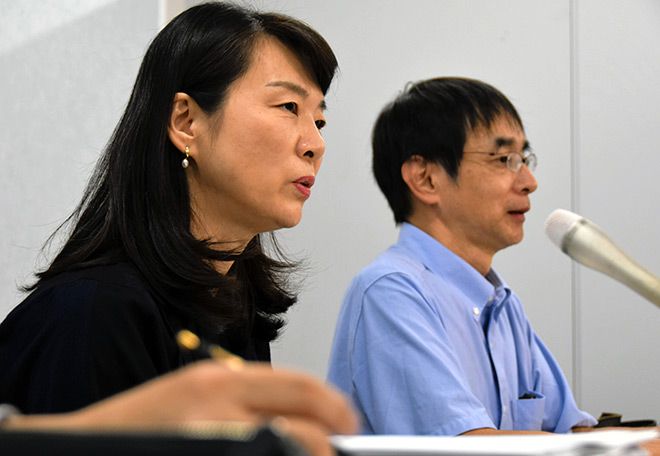OSAKA—The Osaka District Court on Sept. 30 rejected a lawsuit by a Japanese-born professor who lost her nationality after acquiring Canadian citizenship.
She claimed Japan’s Nationality Law violates the Constitution, but the court ruled it falls within legislative discretion.
After the decision was announced, the plaintiff said at a news conference that she would not appeal it.
However, she criticized the court, saying, “The world is so globalized, yet the court is not looking toward the people or human rights.”
RETURN TRIP SHOCK
The woman, now 60, was born in Tokyo and obtained Canadian citizenship in 2008 after marrying a Canadian national. Under Japan’s Nationality Law, Article 11 states acquiring a foreign nationality automatically means the loss of citizenship.
However, she only learned of the loss in 2018 when she tried to return to Japan at the request of her father who was battling cancer.
It was during a consultation at the Japanese Consulate that she was informed she was no longer a Japanese citizen.
FOREIGNER ON PAPER
The woman has since secured a residency visa as a Canadian national and now works at a university in Kyoto, but said she suffers from the loss of her Japanese identity.
Since she cannot renew her passport in Japan, she is unable to travel abroad for work or visit Canada.
In December 2022, she filed a lawsuit contesting her loss of Japanese citizenship.
HUMAN RIGHTS ANGLE
Her legal team argued that the Nationality Law violates Article 22 of the Constitution, which guarantees the freedom to emigrate and renounce nationality.
Her lawyers called the loss of nationality “a severe deprivation of rights, second only to the death penalty,” and claimed it also violates Article 13, which protects personal autonomy.
The Japanese government countered that the Constitution grants the state broad legislative discretion regarding how it defines the requirement of being a “Japanese national.”
It claimed that there are reasonable grounds for asserting it is not unconstitutional.
These include the coordinating “diplomatic protection rights” concerning what bodies protect its citizens overseas and preventing “the drawbacks of dual nationality,” such as conflicts over military service and tax obligations.
MORE DUAL CITIZENS ABROAD
The number of Japanese citizens residing permanently overseas, including those with dual nationality, has been increasing year by year.
According to the Foreign Ministry, as of last October, there were approximately 580,000 such individuals—more than double the 268,000 logged 30 years ago in 1995.
Many appear to wish to retain their Japanese citizenship while also acquiring the nationality of the foreign country where they reside.
Regarding the first paragraph of Article 11 of the Nationality Law, lawsuits have been filed in recent years, including one by eight individuals who started businesses in Europe. Another individual who practiced law in the United States before returning to Japan also filed a case.
However, courts have consistently ruled against the plaintiffs, emphasizing the government’s discretion.
The Nationality Law was enacted in 1899 during the Meiji Era (1868-1912). This law was carried over into the postwar amended law with virtually identical wording and remains in effect today.
Even so, the law requires individuals to submit a “loss of nationality” notification upon acquiring foreign citizenship despite it deeming they lose their nationality upon acquiring another.
Between 1982 and 2024, 36,345 people submitted such notifications. The number surged significantly in 2022, reaching 3,385, as travel restrictions eased following the height of the COVID-19 pandemic.
‘UNAWARE OF THE RULE’
Attorney Teruo Naka of the Kyoto Bar Association who represents the plaintiff, said, “Many people submit the loss notification reluctantly, just to get a visa to return home and see family. There are likely many more who, like the plaintiff, were unaware of the rule and never submitted the form.”
According to research conducted by professor Atsushi Kondo of Meijo University who is an expert on nationality systems, only 38 percent of countries allowed dual citizenship in 1960.
That figure rose to 77 percent last year, especially among developed nations. Japan remains the only Group of Seven country that does not permit dual nationality.
“Japan continues to cling to a ‘single nationality principle’ unchanged since the Meiji Era, despite the global trend toward dual citizenship,” Kondo said.
Maiko Takeuchi, a U.S.-based lawyer and former U.N. economic security expert, argued that international law and precedent are increasingly clarifying how diplomatic protection applies to dual nationals.
Takeuchi pointed out Japan has no military service requirement and tax obligations can be managed through treaties.
“The harm caused by stripping someone of their nationality—tearing apart their life and family—is far greater than the government’s stated concerns,” Takeuchi said.
Speaking of the plaintiffs in similar lawsuits, they lost Japanese nationality for various reasons: to obtain voting rights, to qualify for public contracts or to participate in major research projects abroad.
In exchange, they forfeited their Japanese citizenship.
Takeuchi warns of a “brain drain” if Japan continues to reject dual nationality.
“If Japan does not recognize dual nationality, the more talented individuals sought by other countries will sever ties with Japan and leave, making it harder for them to return,” she said.
She went on to urge that, “A bold policy shift is necessary before Japan loses opportunities for innovation and its national strength declines.”


AloJapan.com